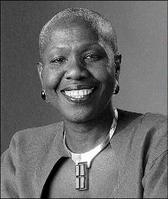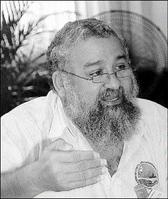Carolyn Cooper, Contributor 

Cooper (left) and Espeut (right)
Like some students, both male and female, at all educational levels, Peter Espeut does not seem to do well at reading comprehension, as evidenced in his 'Gender Politics' article published in The Gleaner on Wednesday, October 17. He appears to be responding to the inflammatory question I ask in an article published in The Sunday Gleaner on October 7: 'Who marginalised men?' But Mr. Espeut clearly has his own (phallic) axe to grind and is not prepared to understand the argument I advance.
So he dismisses my point of view as "defensive". That adjective primarily denotes protective action to ward off danger. But it also has negative connotations of irrational anxiety. The defensive person is constantly on the lookout for attack where none is intended.
Whatever Mr. Espeut's opinion, I certainly wasn't "defensive" in my argument. In neither the denotative nor the connotative sense of the word. Quite the opposite. I was on the offensive. I want alarmists to stop focusing simply on the female/male ratio of the first-year class at the University of the West Indies, Mona, and, instead, really analyse what the figures are telling us about gender politics in Jamaica today.
PROVOCATIVE HEADLINES
Mr. Espeut seems to have been provoked by the headline and became so defensive that he wasn't able to read the rest of the article properly. If he had, he would have realised that I was talking specifically about the teaching profession when I argued that men marginalised themselves by leaving the field for greener pastures. But I do sympathise with him. He was set up by the editors.
Headlines never tell the whole story. Mr. Espeut should know the newspaper business well enough to understand that headlines are designed to catch your attention. The more sensational the better. In fact, the headline, 'Who marginalised men?' was originally my sub-heading for the section on the premature withdrawal of men from the teaching profession. The editors converted the sub-heading into the main heading to provoke response. It certainly worked.
Perhaps Mr. Espeut didn't get my point because he's not prepared to listen to a defensive and, presumably, defenceless woman. On top of that, he seems to have completely missed the comparative degree in my assertion that "I'm not as bothered as some of my colleagues are about the 82:18 gender imbalance." I am bothered; but my sense of botheration challenges me to reject the knee-jerk response to the data.
ENLIGHTENED MEN
Mr. Espeut attempts to draw a fundamentalist line of demarcation between bad 'Women's Studies' and good 'Gender Studies'. In his opinion, 'Women's Studies' is all about the "struggle for the dominance of women over men". And 'Gender Studies' focuses on the 'liberation struggle for both genders.'
But this simplistic distinction certainly cannot be applied to the work of the Women's Studies Working Group at Mona. Our predominantly female members established first 'Women's Studies' and then 'Gender and Development Studies'.
From the very beginning, our academic programme in Women's Studies focused on gender politics. And gender equity, not female dominance, was our goal. Enlightened men became members of the Women's Studies Working Group. They were quite secure in their own gender identity and could engage in 'Women's Studies' with intellectual vigour. It was, after all, a quite respectable academic enterprise.
The name 'Women's Studies Working Group' acknowledged the fact that it was women who first recognised the oppressive nature of institutionalised male dominance and the pernicious effect it has on both women and men. Men were so busy enjoying the power to which they thought they were naturally entitled they didn't have time to even think about its negative consequences. It was the victims who had to revolt.
As a leading member of the Women's Studies Working Group at Mona, I was the most outspoken advocate of the view that we should establish a clear distinction between scholarship and activism. I proposed that the academic programme be termed 'Gender Studies'. The activist agenda of women who were seeking political power within the University and the wider society ought to be carried forward in another forum than the classroom.
There were objections from some colleagues who felt strongly that the political agenda of women needed to be highlighted in the academic programme. Perhaps, they were right. Regrettably, with the institutionalisation of 'Gender and Development Studies,' much of the activist energy of the women dissipated. We focused on teaching "Gender Studies" and not on our own political marginalisation at the university.
BIG BACKLASH
The irony of gender politics at the Mona campus of the University of the West Indies is that the 82:18 ratio of female to male students is not at all reflected in the gender ratio of senior administrative and academic staff. It is true that there has been a significant increase in the number of female professors. And we did have an acting principal who was female. But her appointment was, from the beginning, temporary.
We're back to business as usual. Every single Academic Dean at Mona is male: Medicine; Pure and Applied Sciences; Social Sciences; Humanities and Education. And I certainly don't think the University of the West Indies is going to be ready for a female Vice-Chancellor any time soon.
At the recent Convocation in honour of the Archbishop of York, the Right Reverend Dr. John Sentamu, I was dismayed to see how few women there were in the Chancellor's procession: only two out of 12! What's that gender ratio? A male colleague wondered why I was complaining about the decline in the number of women in the procession since we've had a female prime minister! That's the big backlash. Women should now shut up about gender inequality. I'm sure Mr. Espeut would agree.

